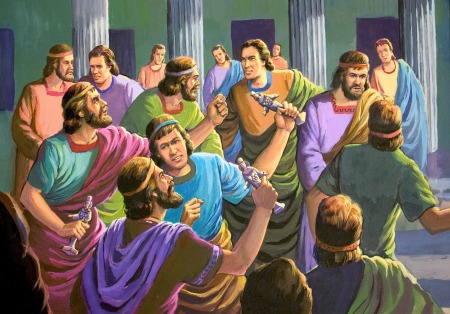In today’s reading Luke tells us about their time on the
island, which turns out to be Malta. The islanders were very kind to the
castaways. Although they briefly think Paul is a murderer since he is bitten by
a snake. They change their minds and think he is a god when he doesn't die. The
chief official, Publius, invites everyone to his home and entertains them for
three days. During that time Paul heals his father which leads all the sick to
come and be healed. Luke says that they honored them in many ways and gave them
the supplies they needed when they set sail on a ship from Alexandria.
From Malta, it seems the sailing was smooth with a few stops
they finally arrive at Rome. When they arrived in Rome, the brothers travelled
from afar to greet Paul. He was allowed to rent a house and live by himself
with a guard.
Once Paul was settled in Rome he called the Jewish leaders
together. They had not received any letters regarding Paul or heard anything
bad about him. Nonetheless, they knew that Jewish people everywhere were
speaking against the sect (Christianity) so they wanted to hear Paul’s views.
Paul arranged to meet with them and preached the hope of
Israel, through Jesus to all who came. Some believed him others did not. Paul
quoted Isaiah to prove his point and let them know that God’s salvation has
been sent to the Gentiles as well. For two years Paul stayed in his rented
house and boldly preached the good news of Jesus.
The story ends on a positive note, Paul has made it to Rome
and continues to preach the Gospel. This means he has triumphed in his mission
for God. Paul lives on to continue sharing the salvation of God in the most
important city of his time. He has lived an incredible life telling his story,
spreading the Gospel and baptizing both Jew and Greek, poor and wealthy,
“average Joe” and king.
I think the two big lessons are: 1) a disciple is a person
of action, always spreading the Gospel and; 2) treat everyone the same. As
followers of Christ we are to go about God’s work here on earth. That may mean
volunteering in a soup kitchen, going on a short or long-term mission trip,
volunteering in a school, at a hospital, anywhere that love, understanding and
patience is needed, giving money to support the ministry of a church, shelter,
or organization offering training and/or relief to those in need, being kind to
the person who was rude to you, smiling at a total stranger or anything that
puts someone else’s needs above your own. Sometimes I think that is the easiest
part, we understand that we need to “give charity” to those less fortunate.
But, do we treat them with the same respect as we would the President of the
United States? Do we recognize their value as human beings to God? Do we
remember that Jesus died for them as much as he did for us?
The real challenge has just begun. Now that we have read the
story of the apostles, we are challenged to continue their work of preaching,
teaching and encouraging to everyone, rich or poor; educated or ignorant;
powerful or weak. Will you accept the challenge? What will you do to spread the
Good News of Jesus Christ?

